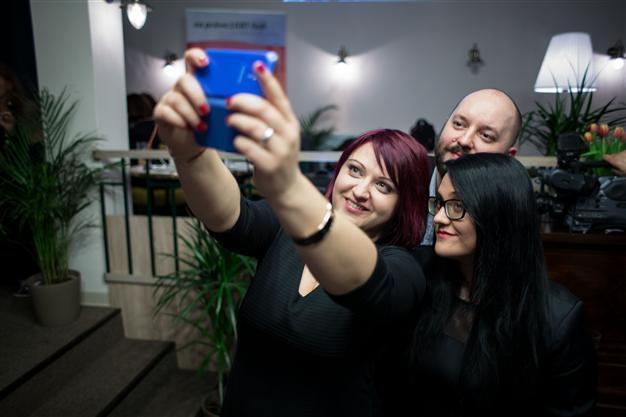Slovak vote on gay marriage, adoption ban a flop
BRATISLAVA - Agence France-Presse

Zezulova (L), Martin Macko and Romana Schlesinger (R) take a selfie after the preliminary unsuccessfull result of the referendum about same-sex marriage, ban of gay and lesbian couples from adopting and sex education classes in schools, in Bratislava on February 07, 2015. AFP Photo
A referendum intended to strengthen a constitutional ban on same-sex marriage and adoption in socially conservative Slovakia fell flat Feb. 7 with low turnout.
Results showed voter turnout in the ex-communist EU country at 21 percent, well short of the 50 percent threshold required for the ballot to be valid.
But 95 percent of those who did vote backed a 2014 constitutional amendment which defines marriage as a union of man and wife -- effectively banning same-sex unions and adoption. The ban remains intact.
While conservatives pitched their campaign as "say 'yes' for the family", gay rights advocates encouraged people to vote with their feet by boycotting it.
"I'm happy that the referendum isn't valid but I'm worried that the general election next year will be an occasion of a new wave of anti-gay sentiment," said Bratislava art gallery owner Andrea Pallang, 40, who has been living with her girlfriend for eight years.
Hate speech against sexual minorities had marred the campaign ahead of the vote.
"We'll continue our struggle to protect the family," Anton Chromik, spokesman for the Alliance for Family (AZR) that spearheaded the referendum, told Slovak public television STV as results showed marginal turnout.
The AZR launched the referendum to cement the 2014 constitutional ban on same-sex marriage arguing that the "European Parliament and some EU members have passed laws that undermine the unique nature of marriage, families and children's rights."
However, the 28-state European Union leaves decision-making on marriage and family policy up to each member.
In Slovakia, a predominantly Roman Catholic nation of 5.4 million people, many see equality and diversity as liberal values "imported" from the West to undermine the traditional family.
Slovakia's ban contrasts sharply with the legalisation of same-sex marriage in more than a dozen countries, including Argentina, France and the United States, but echoes similar bans in fellow ex-communist eastern EU members Croatia, Hungary and Poland.
While EU rules prevent outright discrimination against lesbians and gays on the basis of sexual preference, same-sex couples still cannot share healthcare and tax and inheritance benefits.
Earlier this week rights watchdog Amnesty International accused the conservative circles that launched the referendum of "pandering to homophobic discrimination".
Last month, Slovak SRo public radio pulled an episode of a regular religious programme that included hate speech against sexual minorities.
A transcript of the unaired sermon, which was given by a Greek Catholic priest to a church congregation, slanders gays as "filth" and a "plague" that must be driven out of Slovakia.
"I'm sad and disillusioned about what the campaign ahead of the referendum brought to our country," centrist President Andrzej Kiska told reporters, alluding to incidents of anti-gay hate speech.
The vote was also focused on adoption rights for same-sex couples and whether sex education and lessons on euthanasia should be made compulsory at school.
One of several controversial videos posted on YouTube by gay marriage opponents shows an orphan asking "Where's the mother?" when he discovers that his adoptive parents are both male.
Robert Godal showed up with his wife and two kids to vote at a Bratislava polling station Saturday so that "only the traditional family should have the right to adopt and raise children," he told AFP.
A 2012 opinion poll in Slovakia showed that 47 percent of respondents supported civil unions for gays while 38 percent were opposed.
The Catholic church in Slovakia staunchly backed the constitutional ban on gay marriage introduced last year, but the issue is not one at the forefront of public debate.
"The result suggests family is a top priority for Slovaks, but at the same time they do not want to marginalise anyone," Martin Macko, head of the Bratislava-based Inakost gay rights group, told STV late Saturday.
"The ball is now in the court of the politicians."
